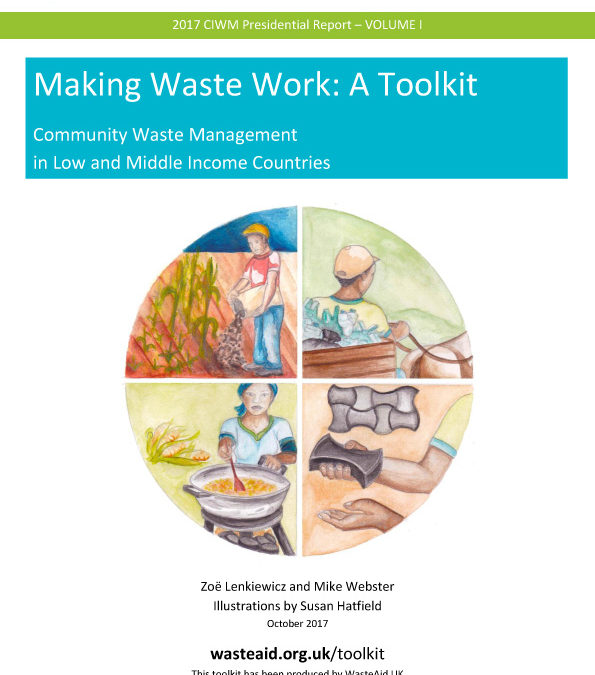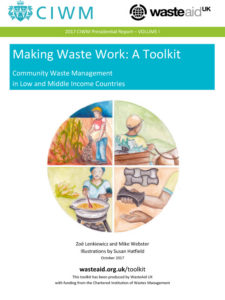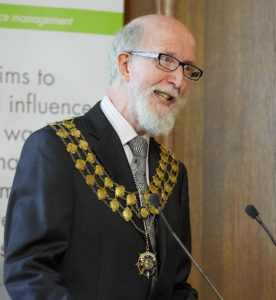13 March, 2018 | Publication, Waste Management
Language matters. DCW’s March column for the CIWM Journal celebrates the dramatic improvements in waste and resource management that have been achieved since he first entered the sector in 1974. This is largely due to changes in public behaviour, which have enabled the UK, for example, to increase recycling rates over the last 20 years from just 6% to 46%. However, he questions how we can expect people’s mind set to change permanently when some local authorities, and both professionals and politicians, continue to refer to modern recycling facilities as ‘the rubbish tip’.
Download html version
Download PDF:
28 February, 2018 | Conference, Publication, Waste Management
DCW’s February column for the CIWM Journal focused on the topical subject of marine plastics. He reported back on ‘Oceans 21’, the latest Development Finance Forum organised by the German Development Bank KfW, where he led a workshop on marine litter. The conclusions were clear: the amount of plastics entering the oceans is at least an order of magnitude greater than estimates of the visible quantities in the oceans or on beaches – so the first priority is to ‘turn off the tap’. And the most effective way to do that is to extend municipal solid waste collection in developing countries to all people and to eliminate uncontrolled dumping and burning; our best judgement was that this could reduce the weight of plastics entering the oceans by 50-70%.
30 January, 2018 | Awards, Publication, Resource and waste management
DCW’s January column for the CIWM Journal showcases the five shortlisted entries for the Best Reuse Project at the CIWM Sustainability and Resource Awards 2017. As the judge for this category, DCW was inspired by the quality and sheer variety of the five very different reuse projects. He hopes that the projects will inspire others too, as we try to ensure that reuse, sitting near the top of the waste hierarchy, receives the same priority as has been given to recycling.
29 December, 2017 | Publication, Waste Management
In his first monthly column in the CIWM Journal as CIWM President, Professor David C. Wilson has revisited his Presidential address. His overall theme for the year is solid waste management as a key utility service, underpinning modern society. Within that three strands are to avoid complacency when it comes to protecting public health and the environment; the continuing move from the linear ‘make – use – dispose’ model to a more circular economy; and the global waste crisis, with more than 3 billion people lacking access to a basic solid waste management service.
https://corazoninc.com/propecia/
DCW writes: ‘“Let us work together to promote the fact that solid waste management is one of the essential utility services underpinning our society. Let us ensure that the regular, daily delivery of that service to protect public health and the environment is not undermined, either by on-going cuts in local authority spending or by deregulation following Brexit”. And again: “It is simply unacceptable that 40% of the World’s population lack this basic utility service that we take for granted. We need to ensure that waste collection is extended to all people, and that uncontrolled dumping and open burning is eliminated.”

18 October, 2017 | Publication, Waste Management

DCW’s CIWM Presidential Report 2017 prepared by WasteAid UK

Professor David C Wilson giving his inauguration speech as CIWM President 2017-18
At his inauguration on 17th October 2017, Professor David C. Wilson launched his CIWM Presidential Report: Making Waste Work: A Toolkit – Community Waste Management in Low and Middle Income Countries. The aim is to help poor communities in the least developed countries, part of the 40% of the World’s population who lack access to any solid waste management services, to help themselves by developing self-sustaining businesses making useful products for the local market from the resource value in their waste. WasteAid UK have prepared this practical guidance on low cost recycling technologies, involving minimal capital investment, to help people become self-employed recycling entrepreneurs, providing a very valuable service for the health and well-being of their community, and the whole planet – as well as reducing poverty and creating sustainable livelihoods.
In his inauguration speech, DCW called on the international community to increase substantially, from the current 0/3% to 3.0%, the proportion of Official Development Assistance directed to solving the ‘global waste emergency’. But he also said that it was not enough to work with national and local governments to solve the problem from the ‘top down’. In parallel, it is necessary to work from the ‘bottom up’, helping communities in the poorest countries, where the local authority often has no funds to provide a service, to tackle the problem themselves through the resource value in the wastes. If, for example, food wastes or plastics are kept separate, they can be turned into new, useful products. One of the gaps identified by UNEP’s Global Waste Management Outlook ( GWMO – for which DCW was the lead author) was for practical guidance on low-cost ‘waste to wealth’ technologies which involve minimal capital investment and make products to sell in a local market.
Making Waste Work: A Toolkit has been developed by WasteAid UK to fill that gap, providing accessible and well-illustrated guidance designed for use by local practitioners. An early draft of the report was field tested at a pan-African workshop in The Gambia. Volume 1 covers part A, Be informed: Community waste management essentials, and part B, Be prepared: How do I make a waste project happen? Volume 2 covers part C, Be inspired: Step-by-step guides, which include measuring what is in your waste, five technologies for recovering value from organic wastes, four focusing on plastic wastes, plus waste collection and safe disposal of the residual wastes. There is also a short Executive Summary. The links above are to the three reports on the CIWM website; the dedicated WasteAid Toolkit homepage gives access to all the material, including the individual How-to guides, in separate user friendly formats designed for mobile devices and for laptops/ desktops.
10 March, 2017 | Publication, Waste Management
Ljiljana Rodic and David C Wilson’s paper in the peer-reviewed open access journal Sustainability was published today: Resolving Governance Issues to Achieve Priority Sustainable Development Goals Related to Solid Waste Management in Developing Countries. As a key utility service that more than 2 billion people are currently lacking, solid waste management (SWM) is a crosscutting issue that can be directly linked to 12 out of the 17 UN Sustainable Development Goals (SDGs). Distinguishing between physical components and governance aspects of SWM, this research focuses on governance issues concerning basic solid waste collection services and controlled disposal, thus addressing the ‘How’ and the ‘Who’ dimensions of a SWM system.
As a form of transdisciplinary research, the findings from the literature on governance issues in SWM were iteratively subjected to several rounds of commentary by a large group of stakeholders from six continents, within the authors’ work for the United Nations Environment Programme (UNEP)’s 2015 Global Waste Management Outlook. The study identifies a combination of complementary instruments required for extending collection to all and bringing disposal under control. While municipalities have a legal responsibility for providing services to their citizens, various service providers can contribute to an effective SWM system. Appropriate forms of funding are essential to secure financial sustainability of the services under the local conditions of affordability and willingness to pay. As new services require behavioural change on the part of citizens and municipal waste departments alike, communication and exchange with other stakeholders function as enabling and supporting factors. The significance of capacity development is highlighted.


